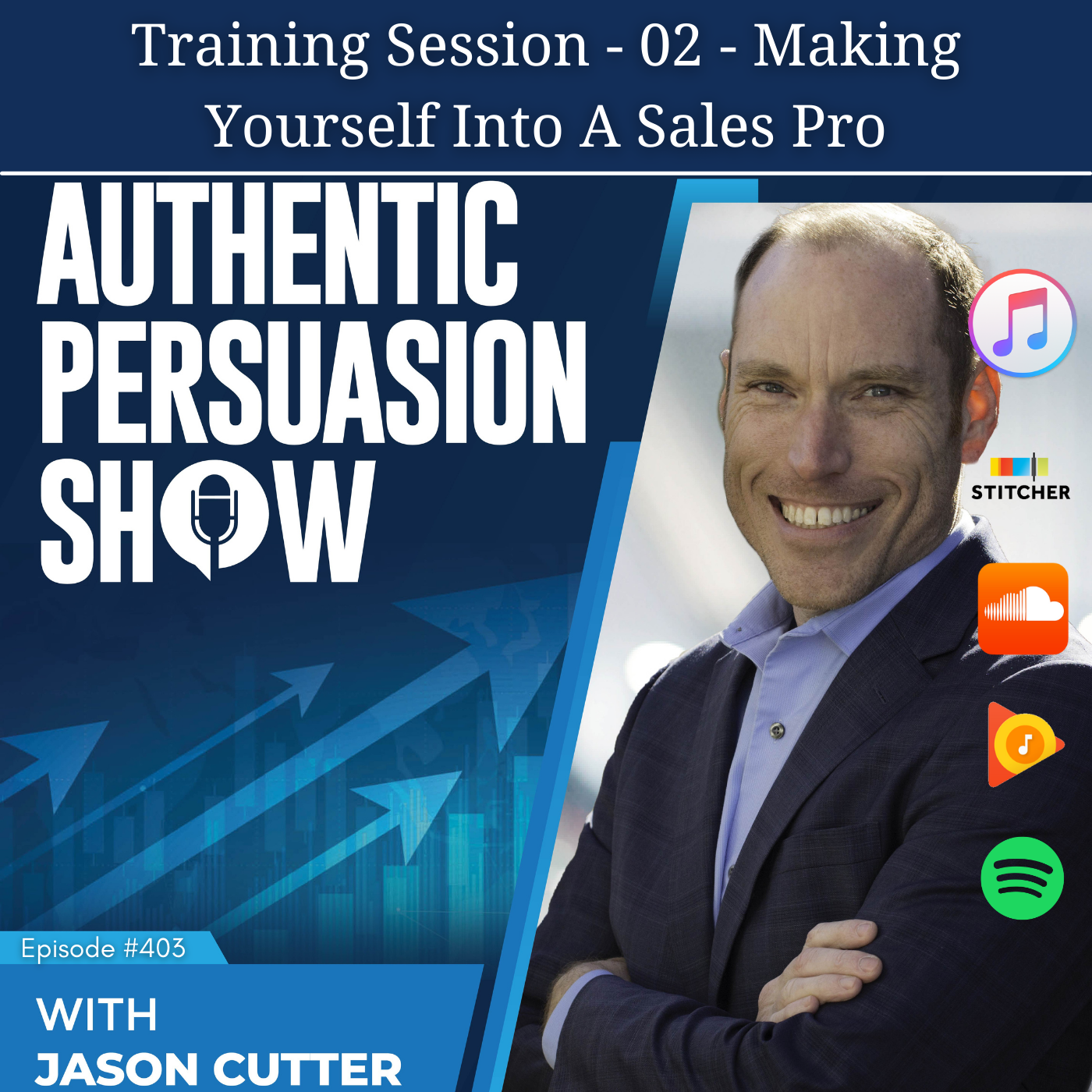Show Notes
Of course, your sales candidate wants a job.
Of course, they want to make piles of money.
That is what most sales hiring managers assume about salespeople.
But that isn’t true. They don’t care about money.
So why do they want your sales job?
Episode 72 – Transcript
Welcome to episode 72 of the sales experience podcast.
So glad that you’re here listening. This is a recruiting week, whether you’re a recruiter, sales manager, or salesperson on the floor or on the phone. My goal is to make this episode of clickable to you, something valuable, and something that you can take with you and help with your career in whatever role that you’re in.
For today’s episode, for part two of recruiting week, I wanted to focus on and hammer down on why the why matters. So why does a recruits a salesperson and applicants, why their why matters? Now, I’ve covered it in many episodes.
You can go back through all of the shows and find it. Week one, I think in week three I’ve covered it several different times. Even in the Q and a episodes, I did it as well. So let’s start with the why.
What is your why? Well, on a big philosophical level, it’s you know, somebody’s purpose. It’s why they’re in existence, why they’re here, what they’re supposed to accomplish with their life. It could also be, you know what gets them out of bed every day.
What makes them want to get up and take on the world or go to work. And I think that’s important at a certain level. Now the big caveat and what I’ve learned in life is that you can have what you think is your purpose or your why or what’s important to you. And that’s just in this time frame.
That’s a snapshot at this moment, at this season of your life and how that applies to you. Now I know in different phases of my life as I’ve gone through, there’s been different reasons for why I’m doing different focus, a different purpose, and at no period if I look back, is that really where I’m at now?
So I didn’t know what my big picture wise and I still don’t, I’m 43 years old. I don’t know what my whole life is going to look like and where it’s going to go and I wouldn’t even pretend to try to figure that out. Now some people have that benefit, some people have the ability to understand their purpose, their why they’re driving that direction, they’re giving it all they can, all of their energy. And even with that being said, I know that we’ll still shift for most people over time.
What I’m talking about for this is why does that sales person want to come in and close deals and make money? So obviously we’re talking about a role that you have available. If you’re hiring, that’s a some kind of base plus commission or Commission only some kind of bonus potential where their performance, their effectiveness, their ability to close more sales will lead to them earning more money.
What you want to know through the hiring process and the managing process is what is that thing that they’re working for? Why do they want to make more money? What’s important in their life and what goals do they have? What does that money mean for them? And again, it’s not about money.
Money is just a vehicle. It’s just energy is just this thing. But it’s a way for somebody to get something that they want. Whether that’s a car, house, vacation, a new cell phone, paying off debt, or it’s the security that comes. Some of those things like having a house or having the freedom to travel. And your goal should be to dig down as deep as possible to find the root of why they want to be successful in that sales role. What is it that they’re trying to accomplish with their life at this moment with your job?
So again, the reason I say that this is valuable, even if you’re a salesperson listening to this episode, is because you want to know that for yourself. I’ve talked about it so many times, is you want to know what drives you. You want to know what’s important, why you’re doing what you do, and why.
If you’ve heard no 50 times today, why you’re going to pick up that phone or have that 51st meeting or knock on that 51st door, why you’re going to do that for you. And what that opportunity in that potential sale means to you, not anybody else.
So if you’re recruiting for a salesperson, you gotta always know why they want it. Now, of course, what does every sales person that you interview going to say, I want to make more money. I want to make bank, I want to have lots of money.
I want to do like, but why? Well, I want to buy new car. Why? Like as deep as you can go as it’s comfortable for you on the recruiting side, as deep as they will let you go on their side personally, go for it. Ask as many questions as possible.
Find out why that’s important to them. Why does it matter? What is driving them? What would they put on a vision board? What is it that they hold dear and drives them? What are they gonna get up for on Monday morning and being excited about the opportunity.
What are they going to get up on Thursday morning and come to the office and still be excited for the potential of closing deals even if Wednesday wasn’t successful, even if they’re tired towards the end of the week, what’s going to drive them day in and day out, week in and week out. And I’ll tell you based on experience that the bigger that why is the more emotionally tied they are to that individual thing.
What they’re looking for, what they’re trying to accomplish or what they need to pay for. The bigger that is, the harder they’re going to work, the more effort they’re going to put in place. And the more that you’re going to have to probably pull them back from how hard they want to work and how much they want to get done instead of trying to push them forward and motivate them.
The last that you’ll need to have spiffs and bonuses and contests and carrots that you dangle in front of them to bribe them to work harder because they are there for the big money, the big bonus, that’s what they want. And so you don’t need as much the character of the stick because they’re going to drive themselves for why they are there and what matters to them.
So what do you do when somebody doesn’t have that, when they don’t have a big why, when they’re not really driven well, you can hire them, bring them on board?
It depends obviously on the nature of what you’re selling, your sales cycle, the level of experience and professionalism you need from your sales team, tissue. When you’re hiring somebody in, you know, if you’re hiring them, it’s business to business and they’re an SDR, so they’re setting appointments or just doing the initial phone calls.
Maybe that doesn’t matter as much, but I’ll tell you based on my experience, having somebody on the team who doesn’t have a very big Y or doesn’t have a big reason, they’re just looking for a job because they feel like they should have one and they know that it’s important and they don’t really like the other options and this one sounds like it would be good or easy.
That person will be somebody you always have to push. You will have to push them with the carrot or the stick for a lot of their sales career if they’re not intrinsically motivated to crush it.
Now on the flip side, depending on your company, your comp structure, the progression plans of where they could move up to and what they could do within your organization. You may also find that somebody who has a giant y who’s got this big drive and the skills to back it up to make it happen may not stay with your organization very long.
Depends again, on your structure. Where I’ve seen some organizations where you know there’s a range of people that are good for it, but if somebody is just amazing, then they’re gonna Max out at that company.
They’re not going to make as much money as they know they could in some other organization or a different product, different price point, different structure, commission, whatever that might be, and so they’re going to get to the point where they’re just, they’re done, they’re too big, they’re too successful, too skilled for where they’re at with you.
They’re going to move on, and that’s fine as well. I’m totally okay with all of those kind of reps because they’re going to give every day and they can, they’re going to close lots of deals. Everyone’s going to win while they’re there and then they’re going to move on and that’s fine.
The other end of the spectrum are the people you have to push constantly. That’s the ones you want to watch out for. Those are the ones that you don’t want on the bus. Those are the ones you don’t want along for the ride on the sales team because they will require so much work by management, by HR, pushing them all the time.
Now again, this isn’t a skills function. I’m not talking about people who are good at sales versus not good at sales. I’m not talking about experience like somebody who has the pages of sales jobs on their resume versus somebody who is let’s say fresh out of school or has been working retail.
Now they want to get into a telephone sales job or work at your retail location. I’m not talking about that. I’m talking about the tri. I’m talking about the why. I’m talking about their attitude and their what is moving them forward and what they want because if they have the drive and the y, they can learn the skills. Sales is a skill.
Closing deals is a skill. Reading a script, talking to people, persuading people, active listening. All of those are skills. But if somebody is not motivated and driven for their own reasons, it’s going to be like trying to push a giant boulder uphill and it just doesn’t work. And if it does work, it takes too much effort and you should put your effort into other areas. So for me, when I used to interview people, I got to the point where I didn’t really care about what the resume was.
I just had a conversation with somebody. What was on paper, didn’t matter because they’re just making up a story or telling me a story anyway. I want to know who they are, what are their interests, you know, kind of get a vibe for how they are and then literally like what drives them, what gets them up in the morning, why do they want the job? What is it they’re trying to accomplish? You know, what income goal do they have when it comes to bonus and commission? Like where do they see themselves and then what’s that money for? It can’t just be for the sake of, I need more money. What is that for?
All right. Hopefully that helps in your recruiting efforts. Again, if you’re a sales person, listen to this. If you don’t have something that’s driving you, you’re already realizing that it’s a struggle for you every day to stay motivated and to be doing what you need to, and maybe sales is not the right thing, or maybe you just need to find a big why and reconnect or connect with what it is that you like.
What wakes you up every day? What you want to accomplish, your big goals, maybe like travel, whatever that might be. Managers, recruiters, you already know this. Make sure to subscribe to the show wherever it is. It’s everywhere online. If you can’t find it, send me a message. Cutter consulting group.com you can also find me on LinkedIn.
Always. Remember that everything in life is sales and people remember the experience you gave them.
![[E72] Recruiting Week: Why does your candidate want a sales job?](https://episodes.castos.com/salesexperiencepodcast/images/TSEP-Cover-Recruiting-Week-1.png)


